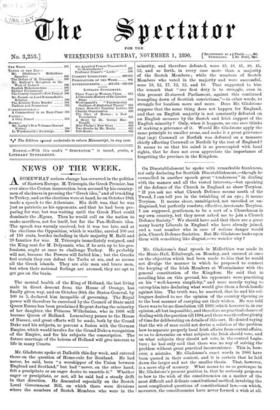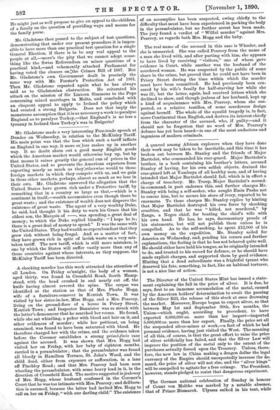Mr. Gladstone's final speech in Midlothian was made in the
Music-Hall, Edinburgh, on Monday, and entered at once on the objection which had been made to him that he would not divulge the manner in which he proposed to connect the keeping of the Irish Members at Westminster with the general constitution of the Kingdom. He said that in assailing him on this ground, his opponents were practising on his " well-known simplicity," and were merely trying to entrap him into declaring what would give them a fresh handle against him. The truth was, he asserted, that be and his col- leagues desired to see the opinion of the country ripening as to the best manner of carrying out their wishes. He was told there was to be no dissolution till 1893 (which however is, in our opinion, all but impossible), and therefore no practical chance of dealing with thequestion till 1894, and there was therefore plenty of time for deliberating on details of this sort. He denied saying that the wit of man could not devise a solution of the problem how to separate properly local Irish affairs from central affairs, so as to determine on what subjects the Irish should vote, and on what subjects they should not vote, in the central Legis- ture ; he had only said that there was no way of solving the problem without great practical inconvenience. This is, how- ever, a mistake. Mr. Gladstone's exact words in 1886 have been quoted in their context, and it is certain that he laid down the larger and not the smaller thesis. That, however, is a mere slip of memory. What seems to us so grotesque in Mr. Gladstone's present position is, that he seriously proposes to bow to the wish of the constituencies on a matter of the most difficult and delicate constitutional method, involving the most complicated questions of constitutional law,—on which, moreover, the constituencies have never formed a wish at all.
He might just as well propose to give an appeal to the children of a family on the question of providing ways and means for the family purse.



















































